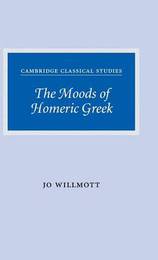
|
The Moods of Homeric Greek
Hardback
Main Details
| Title |
The Moods of Homeric Greek
|
| Authors and Contributors |
By (author) Jo Willmott
|
| Series | Cambridge Classical Studies |
|---|
| Physical Properties |
| Format:Hardback | | Pages:278 | | Dimensions(mm): Height 216,Width 140 |
|
| Category/Genre | linguistics
Literary studies - classical, early and medieval |
|---|
| ISBN/Barcode |
9780521879880
|
| Classifications | Dewey:883.01 |
|---|
| Audience | | Professional & Vocational | |
|---|
|
Publishing Details |
| Publisher |
Cambridge University Press
|
| Imprint |
Cambridge University Press
|
| Publication Date |
29 November 2007 |
| Publication Country |
United Kingdom
|
Description
Homeric Greek has a particularly rich system of moods which are analysed in this 2007 book in the light of theoretical interest in the semantic domain of modality. The domain is one of the most complex and interesting, since modal forms are used for the most 'subjective' of messages, expressing our beliefs, intentions, desires, abilities and wishes. Incorporating findings from the theory of grammaticalisation, this study considers the Homeric Greek modal system from a diachronic perspective and offers a radical revision of traditional accounts. Providing insights into both individual constructions as well as the overall system of modality in Greek, it will be of interest to general linguists, linguists studying ancient Greek, and also scholars interested in fundamental questions of meaning in Greek. The indices, where all the instances of the moods in the Homeric poems are categorised into types, also make it useful as a research tool.
Author Biography
Jo Willmott is a Research Fellow at Queen's College, Cambridge, and an Affiliate Lecturer in the Classics Faculty at the University of Cambridge.
Reviews'The synchronic analyses of the Greek moods in the book are excellent: they are more sophisticated and detailed than those found anywhere in the standard handbooks. Close study of this book will make one a more semantically sensitive and thus better reader of Greek.' Bryn Mawr Classical Review
|